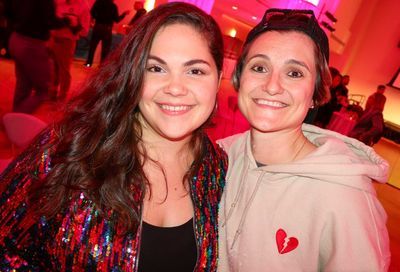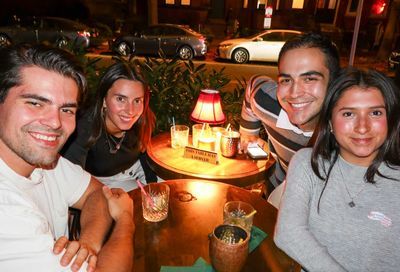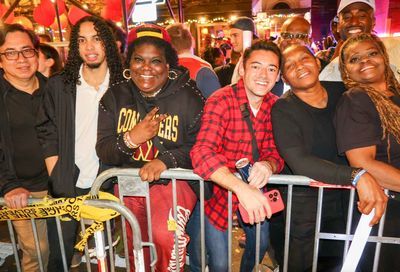Line in the Sand
Tunisia gets a timely lesson in banishing bullies
The summer between sixth and seventh grade – for me, 1981 – I’d gone to visit my dad, stepmom and new baby sister. It was my second ”divorce summer,” meaning a summer spent away from home, chez Dad. The destination was the same as the first, three years prior, Tunis.
My memories of the country are pricked whenever I walk past the Tunisian Embassy at 15th Street and Massachusetts Avenue NW, just a couple blocks from the Human Rights Campaign headquarters. The boxy building itself isn’t much to look at, but next to the front door is a charming tile mosaic that exudes that warm Mediterranean aesthetic of this country forming Africa’s northernmost tip. For some reason unknown to me – aside from the time I watched him photograph a Soviet freighter in a southern port – my Army dad’s job had us trekking all over Tunisia. From Bizerte in the very north, the breathtaking beauty of seaside Sidi Bou Said just outside Tunis, to the resort areas of Hammamet and Djerba, and into the desert holes of Matmata and the Roman ruins of Dougga, Tunisia and Tunisians made an immeasurable impression. A whiff of jasmine or an imam’s call to prayer are always sure to pry loose another memory.
In the years I was there, topless tourists at the beach were the norm. During that 1981 summer, the visit was actually extended and I was enrolled at the American Cooperative School of Tunis (ACST), where a field trip meant heading to a local winery and even a stop in the tasting room. Tunisia was a world away from Islamic counterparts like Saudi Arabia or Iran. My exposure to an Islamic nation was of one more sophisticated than my own.
The U.S. embassy I remember visiting as a kid is no longer there. It was replaced by a more modern installation in a newer part of Tunis, Les Berges du Lac, home to several embassies. It’s now much closer to ACST. Close enough, actually, to make my old school a target of recent protests. While the school today is a much larger institution than in the days I attended seventh grade, the photo I saw online of a building charred by fire looked to be one facing the outdoor area where we kids would line up in the morning, where we’d eat lunch in the afternoon.
When Tunisians launched the Arab Spring, I was happy for them. Tunisia has long led the Arab world when it comes to gender equality, so I was particularly heartened to see the role women played in the revolution. The post-revolution period has seen the launch of an online gay magazine, Gayday. This is an exciting time.
But revolutions are tricky. Ask Cambodians. Ask the French. I’m still rooting for those progressive Tunisians. For them and their likeminded counterparts in Libya, Egypt and elsewhere, the fight is so far from over. Extremists are on the move and would, given the chance, be more oppressive than the presidents-for-life who have been toppled.
ACST’s director, Allan Bredy, told Tunisialive that Salafist extremists targeted the school, followed by a second wave of ”delinquents” whom he and staff chased from the school.
”A total of 20 staff members … intervened during the course of the looting, driving away trespassers with baseball bats and other objects and taking back some of the items that were being stolen,” Tunisialive reported. ”The looters that Bredy and his colleagues encountered offered little resistance and mostly scurried away. … ‘They were embarrassed,’ Bredy said.”
I hope there is a lesson here for moderate and progressive Tunisians that standing up to bullies, as Bredy and staff reportedly did, can show those bullies to be cowards. I hope too that Tunisia will always be the beautiful country to which I want to return, a country that prides itself on equality and liberty.
Will O’Bryan is Metro Weekly‘s managing editor. Contact him at wobryan@MetroWeekly.com.
Support Metro Weekly’s Journalism
These are challenging times for news organizations. And yet it’s crucial we stay active and provide vital resources and information to both our local readers and the world. So won’t you please take a moment and consider supporting Metro Weekly with a membership? For as little as $5 a month, you can help ensure Metro Weekly magazine and MetroWeekly.com remain free, viable resources as we provide the best, most diverse, culturally-resonant LGBTQ coverage in both the D.C. region and around the world. Memberships come with exclusive perks and discounts, your own personal digital delivery of each week’s magazine (and an archive), access to our Member's Lounge when it launches this fall, and exclusive members-only items like Metro Weekly Membership Mugs and Tote Bags! Check out all our membership levels here and please join us today!




















